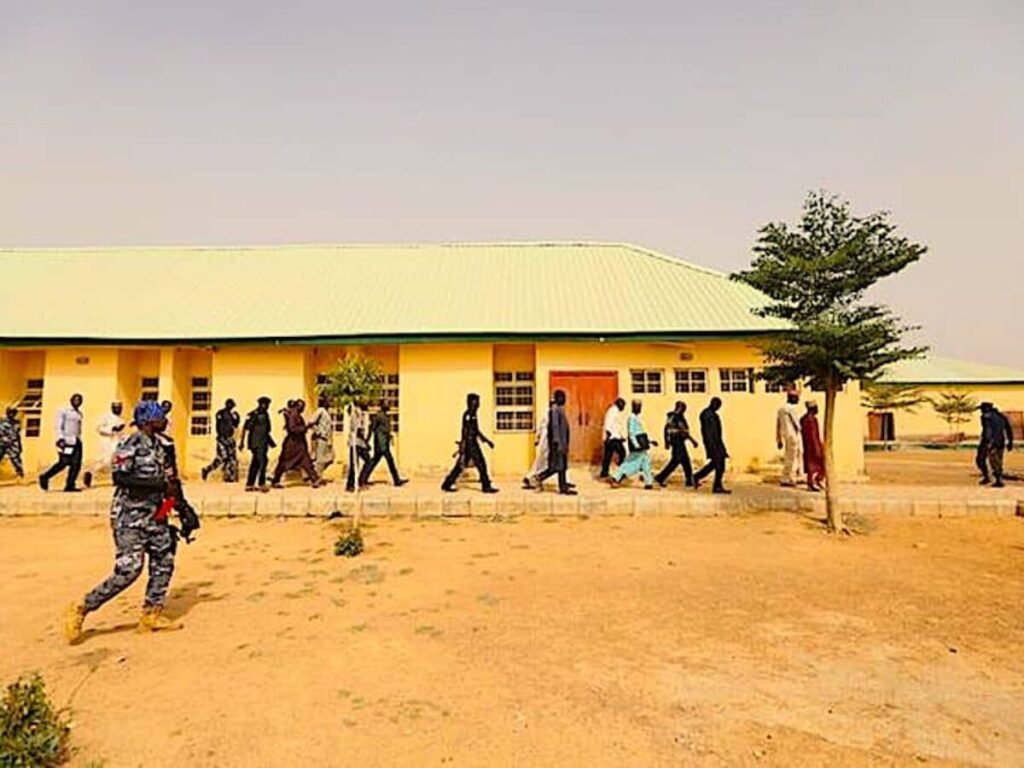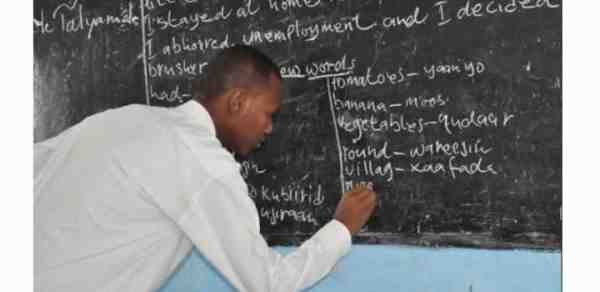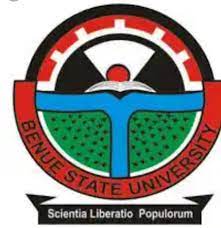Education
Ortom Distributes 35,000 Desks, Seats to Benue Primary Schools

From Vincent Nyinongu, Makurdi.
Benue State Governor, Samuel Ortom has flagged off the distribution of 35,000 customized chairs and tables for primary schools in the state.
It was the first batch of 61,000 chairs and tables the Ortom administration in collaboration with Universal Basic Education, UBEC, plans to distribute to Benue primary schools this year.
Over 30,000 of the customized desks and chairs were distributed to schools across the 23 local government areas last year.
Flagging off this year’s distribution, Governor Ortom expressed his commitment to uplifting the standard of education as seen in the ongoing upgrade of school facilities with more contracts for the school projects to be awarded when Government accesses the N2 billion bank facility it is processing.
“Investment in education is for the development of the society, and I am passionate about it. That is why I am repositioning SUBEB to make it strong so as to meet the aspirations of Benue people,” he stated.
The Governor gave assurance that the hiring of 5,000 teachers would be carried out as soon as the existing loopholes in the State Universal Basic Education Board, SUBEB were plugged and other forms of fraud were also curbed.
He vowed never to shield anyone found to be involved in corrupt practices.
On securing the new chairs and tables, the Governor said he had directed the State Attorney General and Commissioner for Justice to design a legal instrument to enable the Government to search the homes of those in the habit of converting the school furniture to personal use.
Speaking on the impending recession in Nigeria which is projected to contract the economy of the country in 2020 by 3.4%, sequel to which crude oil benchmark had now been pegged at $20 per barrel with adverse effects on the Federal and State Governments, Governor Ortom said the way forward was to return to agriculture.
He urged the people to prepare for the recession by cultivating every available arable land to produce food for sustenance and commercial purposes.
The Governor also reminded the people that COVID-19 is real and the best way to prevent the pandemic from spreading is adherence to measures such as social distancing, frequent hand washing with soap and avoiding public gatherings such as markets, burials, as well as religious and sporting events.
Earlier, Commissioner for Education, Professor Dennis Ityavyar and the Chairman of SUBEB, Comrade Joseph Utse, had commended the Governor’s giant strides in the development of basic education and the Education sector in general, even as they pledged their loyalty and support in that regard.
First Class Traditional Ruler, Tor Kwande, Chief Ambrose Iyortyer, State Coordinator of Universal Basic Commission, UBEC, Mrs. Augustina Sanchi and State Chairman of Parents, Teachers Association, PTA, Comrade Dugeri Benjamin in their separate goodwill messages commended the effort of the Governor in ensuring quality education at foundation level.
They also praised his effort in tackling the spread of COVID-19 as well as remaining resolute in the fight against insurgency and urged that the seats be put to use for the purpose it was meant for.
Education
Abia, Imo Residents Decry High Fees in Private Schools

Education stakeholders in Abia and Imo have expressed deep concern over the exorbitant fees charged by private schools in the country.
A cross-section of the respondents blamed the phenomenon on the lack of effective monitoring of the schools by the regulatory agencies of government at all levels.
In Abia, the people blamed the commercialisation of education by private schools on ineffective regulatory policy framework and weak monitoring mechanism by agencies of the government.
They spoke in separate interviews, saying that the onus was on government to check the unhealthy phenomenon.
They called on the State Government to evolve an effective monitoring mechanism to
ensure that private schools deliver quality service to their pupils and students.
Mr Osondu Kalu, a father of two, said that effective monitoring of private schools by the relevant authorities would help keep them in check for the purpose of quality education.
Kalu said that issues of unqualified teachers, substandard curricula, and uneven education quality had become a disturbing trend in private schools..
He said that most parents developed preference for private schools because of the failure of the government to upgrade the educational facilities in public schools.
Kalu said that the school fees in highly rated private schools are high and beyond the reach of an average Nigerian parent.
According to him, this unfortunate trend among private schools with exorbitant fees ought to be addressed by the government.
Kalu, therefore, called for effective monitoring of the private schools by the relevant authorities to ensure that the standard for quality education was maintained.
A civil servant, Mrs Dorine Ahamefule, said that some private schools were set up with the primary objective of making money rather than imparting knowledge to young minds.
Ahamefule said that the unusual focus on money instead of imparting knowledge had become a serious challenge, especially given their inability to hire qualified teachers or pay well.
She said that parents should feel the effect of the high fees they pay on their children’s academic performance.
Ahamefule also said that paying teachers well translates to building a highly motivated teachers staff and better productivity.
“However, this comes with a downside, where the fees do not always correlate with the quality of education delivered, especially when schools employ unqualified teachers.
“This practice can lead to substandard education, undermining the value parents expect from their investment.
“The employment of unqualified teachers is often a cost-saving measure, which can compromise the educational quality and outcomes.
“This scenario raises concerns about the commercialisation of education, where profit sometimes outweighs educational quality,” she said.
A disability advocate, Mr Ikenna Ebiri, urged parents and guardians not to equate high fees with high quality, saying that some affordable schools might offer quality education.
Ebiri said that in spite of the high fees, not all private schools invest adequately in infrastructure or human resources, leading to disparity in the quality of education.
He said that with the proliferation of private schools, maintaining a competitive edge, while ensuring affordability and quality, is challenging.
Ebiri, therefore, called for enhanced regulatory framework to ensure all schools meet a minimum standard in teacher qualifications, facilities, and curriculum.
He called on the government to make education less elitist, through scholarships, waivers to private schools and remodelling of public school system.
Some parents and education experts also urged the Federal and State Governments to support private schools in order to lessen the financial burden they transfer to parents.
They further called on the government to introduce free education in public schools.
They urged the government to make public schools more attractive in order to discourage parents and guardians from patronising substandard and expensive private schools.
The Chairman of Parent-Teacher Association, Holy Rosary Secondary School, Umuahia, Mr Edward Okoro, said the high operational costs contribute to exorbitant fees charged by private schools.
Okoro said that most private schools with population between 50 and 100 students might not be able to cover their expenses in running the school, including payment of teachers’ salaries.
“Government has a lot to do and one of them is to make education free in primary and secondary schools.
“If the public schools are renovated and equipped with qualified teachers, many parents will begin to patronise them, instead of taking their children and wards to private schools.
“And when that is done, the exorbitant fees by private schools will no longer be there, which might cause some of them to close down,” he said.
Also, Prof. Rose Uzoka, the Dean, College of Education, Michael Okpara University of Agriculture, Umudike, urged the government to subsidise private schools to check high charges.
Uzoka said that most of the private schools “pay tangible amount” of taxes to the government and needed to recover the money through school fees and other charges.
She said : “I doubt if there is any private secondary school in the South-East that charges as much as N3 million or N4 million as school fees.
“The government is not doing enough to help these private schools, but that should not be an excuse to exploit parents in the name of school fees.
“There are different ways that the government can support the private schools to lessen the burden of exorbitant school fees”.
A parent, Mr Kalu Ukpai, lamented that some of the private schools charge exorbitant fees but employ unqualified teachers, whom they pay poor salaries.
Ukpai said that the issue of high cost of education has become a serious concern, especially now that things are generally tough in the country.
“Many families are finding it extremely difficult to make ends meet.
“How then can they cope with the high school fees, especially for those with many children?
“But, I am happy for what Gov. Alex Otti is doing in the education sector now in Abia, especially with the remodeling of public schools and his plans to introduce free basic education next year.
“The governor’s move will bring back the lost glory in public schools and pull people out from the private schools,” he said.
In Imo, some private secondary school teachers lamented that they were being underpaid, saying that their salaries and other emoluments were not commensurate with their output and school fees paid by the students.
Mrs Oluchukwu Ferdinand, who holds a Higher National Diploma in Education and teaches in a private secondary school, said that her employer always referred to the HND/BSc dichotomy as his reason for underpaying his teaching staff.
Ferdinand said that the attitude explained why the proprietor employed only HND and Ordinary National Diploma holders, adding that this was affecting the teachers’ approach to their duties.
Another teacher, Miss Uchechi Okoro, said that the lack of government measures to checkmate the activities of private schools was also a factor.
Okoro said: “I’m one of the 15 teachers in the secondary school where I teach, seven are regular staff members, while eight are youth corps members, who get a paltry allowance to augment what they receive from the Federal Government.
“But because nobody checkmates these things, they just keep happening and there is little or nothing the teachers can do about it,“ she said.
She argued that changing corps members annually was affecting the students performance negatively and called on government not to allow inexperienced corps members take over the core duties of teachers as assigned in the curriculum.
A head teacher, Mr George Ojiaku, blamed the low remuneration of teachers in private schools on government’s failure to provide adequate remuneration for teachers in public schools.
Ojiaku said that since government sets the standard for the private sector, “it would be difficult to expect perfection” from the latter.
The Proprietress of Sound Foundation Academy, Emekuku, Owerri, Mrs Chinwendu Osuji, said that the location of a school determines the fees charged which, in turn, determines the remuneration of teachers.
Osuji called on government to establish modalities for equitable school fees charged by private schools. (NAN)
Education
Education, key to Changing Nigeria, says NTI D-G

Prof. Sadiya Sani-Daura, Director-General, National Teachers’ Institute (NTI), Kaduna, says education is key to changing and transforming Nigeria in all ramifications.
Report says that she spoke on Wednesday in Kaduna while declaring open nationwide training workshops for 222 basic school teachers drawn from across Nigeria.
The five-day training is also focusing on E-learning, climate literacy and green life skills.
The training is taking place simultaneously in Kaduna and Lagos, with the participants drawn from the 26 states and FCT.
It has as its theme, ‘Digital Pedagogy, Remote Learning, E-Learning, Climate Literacy and Green Life Skills.’
The training was organised by the Institute in collaboration with the Universal Basic Commission (UBEC).
She said, “With the right attention given to the education sector, a lot of the negative narratives in Nigeria will change for the better.
” A lot of things went wrong hitherto because education was not getting the desired attention.
“With education getting the desired attention, everything will change, including combating criminality.
“It is however gladdening that the present administration of President Bola Tinubu is unwaveringly committed to redressing the obnoxious situation.”
The director-general further reiterated the unwavering commitment and dedication of the Institute to teacher training and development.
According to her, NTI will remain steadfast in making the Nigerian teachers globally competitive,hence helping to restore the lost global glory of the nation.
Sani-Daura, said they represent a milestone in the collective effort to advance teacher education and strengthen the foundations of basic education in the country.
She said that NTI, in collaboration with UBEC has consistently championed innovative strategies to equip the teachers with the skills and knowledge required to address the evolving demands of modern education.
Sani-Daura said, “Today’s workshops reflect this commitment, providing an avenue for professional development that aligns with global best practices and national priorities.
“The first focus area, which is digital pedagogy, remote teaching and e-learning, comes at a time when technology has become an integral part of the teaching and learning process.
“Teachers must be empowered with the tools and skills to harness the potential of digital platforms to enhance instruction, engage learners and foster critical thinking.
“This training is expected to bridge the gap between traditional teaching methods and the emerging trends in education technology as well as prepare the teachers to thrive in the digital age.”
On climate literacy and green life skills, the director-general decried that the world was grappling with the effects of climate change, saying, “our responsibility as educators goes beyond academics.
“Teachers play a critical role in shaping attitudes and behaviours that promote environmental sustainability.
In a welcome address, Dr Bature Salisu, Special Technical Assistant to the director-general, said that the collaboration between NTI and UBEC underscored the shared vision and partnership to advance teacher education.
He said, “This initiative is a testament to the NTI’s unwavering commitment in enhancing the professional capacity of teachers and addressing contemporary educational challenges.”
According to Salisu, the training reflects a collective resolve to equip teachers with innovative teaching methodologies and critical life skills to prepare students for the demands of the 21st century.
The acting Registrar of the Institute, Mrs Zainab Aliyu, described the theme as apt and timely.
She stressed that Nigerian teachers must not lag behind, urging them to be creative using technology.
The teachers attending the workshop at Kaduna were drawn from all the Northern states and FCT while the participants at the Lagos centre were drawn from all the Southern states. (NAN)
Education
Private School Operators Deny Charging Exorbitant Fees, Hiring Unqualified Teachers

Some owners of private schools in the South-South region say they only charge school fees that are commensurate with the quality of service being offered.The private school owners made the expression during a News Agency of Nigeria (NAN) survey in Akwa Ibom, Cross River and Rivers.Mr Godwin Okwu, the Chairman, National Association of Proprietors of Private Schools, (NAPPS), Cross River chapter, said that the fees charged by private school in the state were not exorbitant.
Okwu further said that it was untrue that private schools employed unqualified teachers. “Whatever we charge as school fees is commensurate with the quality of service we provide.“Private schools may look expensive, this is because the government does not subsidise their services the way they do for public schools.“In some public schools, the government pays for everything including staff, and still collect fees from the students,” he said.He said it was wrong and unfair to compare the public school system to the private school system in terms of fees because public schools enjoyed the full support of government.“What we should consider is the quality of service and the product. It is not in doubt that the private school system is producing better results.“So it is unfair and contradictory to say that private schools employ substandard teachers, how then are we able to produce good results if our teachers are of low quality?” he said.The NAPPS chairman however said that private school owners were sometimes forced by economic realities to carry out minimal increase in fees.“Currently, the minimum wage for workers has increased, and private schools are expected to pay. How else do we raise the money to pay salaries?Okwu urged the state ministries of education to be more proactive and thorough in undertaking their inspectorate and monitoring functions.“As the regulator, the ministry should ensure uprightness. The interest of the children should be in the forefront,” he said.On his part, Mr Daniel Effiong, a Director of Inspection in Cross River Ministry of Education, said it was misleading to say that private schools employed low quality teachers.He said that the ministry had been resilient in monitoring the activities of private schools in the state.“We check the qualifications of the teachers, the environment, toilets among others before approval and upgrading.“This exercise is not just once, we do it regularly. Surely there are bad eggs in the system, we penalise them when they are uncovered,” he said.Also speaking on the issue, Mr Ubokmfon Williams, NAPPS Chairman in Akwa Ibom, said that private school owners in the state had not increased fees in a long time.Williams said that the economic situation in the country had made it difficult for private school owners to increase school fees.“With the way the economy is, any unnecessary increment in school fees may lead to massive withdrawal of students.“If you understand school business, if you truly want to remain in business, you have to avoid unnecessary increase in fees,” he said.The NAPPS chairman however said that sometimes, economic realities force private owners to increase fees in order to meet up.“Take salary as an example, if you don’t increase fees, how do you pay salaries of your workers. When you can’t pay salaries, your employees will go elsewhere.“As private school operators, we look critically at the interest of parents and the economic situation in the country before taking decisions.“We also want to remain in business, we are aware that the priority of every parent at the moment is food. We are very careful not to lose our market,” he said.Speaking on the reason private schools do not have uniform school fees, Williams said that criteria such as location and quality of service are considered by schools before fixing their fees.“Some schools pay for excursions, school bus, medicals, security, and some schools are located far away from town.“One thing is that no private school unilaterally fixes school fees, every private school liaises with its Parents Teacher Association before deciding what the fees will be,” he said.Speaking on the quality of services being offered by private schools, the NAPPS chairman, said that private schools did not treat the issue of teachers qualification with levity.“We hire not just good and professional teachers, we ensure that our teachers posses the skills to impart knowledge.“We are aware that a teacher may be a professional but may not skillful, so in the private school system, we are goal oriented,” he said.Mr Assam Abia, an Eket-based parent whose children are in private schools, said that more families took interest in sending their children and wards to private schools because the public school system failed at some point.“Parents are only seeing the fees charged by private schools as exorbitant because of the current economic challenges.“What I see is that school proprietors are responding to the basic economic law of demand and supply by increasing their fees,” he said.He said that the employment situation in the country had left many graduates without jobs, and that those who did not train to become teachers were now working as teachers.“Private schools are in business, they must make profits. The remedy lies in the monitoring agencies to do their jobs effectively.“The ministry or department that supervises private school should be more thorough and proactive, we want to see them in action,” he said.Abia also called for an overhaul of the education sector through legal and policy frameworks that would put the sector on the right track.“There is an urgent need for the Federal Government to declare a state of emergency in the education sector. Governments need to pay attention to the activities of private schools.In Rivers, a Legal Expert, Dr Hilda Desmond, blamed the fees being charged by private schools on the lack of supervision by regulatory authorities.Desmond, the Chairman, Nigerian Bar Association, Ahoada Chapter, said that poor regulation and supervision of private schools had negatively affected primary and secondary school education in the state.“The education sector has been grossly bastardized particularly by private operators. Private operators exploit parents without making efforts to step up operational standards.“What we call exorbitant fee is purely class driven. Some elite see high school fees as a sign of quality, and prefer to enroll their children in such schools.“It is a matter of choice, here are still schools with qualified teachers, affordable school fees and appreciable learning environment,” she said.The lawyer expressed concerns that some schools greedily converted child minders to classroom teachers and pay meagre salaries.She said that it was an act of wickedness for school operators to use poor quality teachers at the nursery and primary school levels.“Once there is a faulty nursery and primary education, the entire learning process of the child becomes ruined. So we must strive to get it right from the first stage.”Sadly, most private schools are in business, rather than employ qualified teachers that should impart knowledge, they compromise examination standards,” she said.Mr Isijana Adasi, a Port Harcourt-based Education Consultant, said that all tiers of government had failed to provide the atmosphere for quality education to thrive.Adasi, also the Lead Advisor, Adasi Science Project, identified inadequate budgetary provisions for education as a major reason for the inefficiency in supervision and monitoring of the private school system in the country.“This is part of the reasons that education inspectors have become vulnerable, and are now compromising standards.”Most school inspectors visit high profile schools with the mindset of receiving money and other packages without being thorough about their duties.“So, until regulatory authorities become committed to their duty of enforcing standards, the average Nigerian child may not get the best education, it does not matter how much parents pay as fees.Mr Isaiah Uwa, a Bori-based parent, urged the Federal Government to take more stringent steps towards improving the quality of service being offered by private schools.“Part of the efforts should also be to monitor what they charge as school fees. Quality and standard should be the primary consideration.“Some private schools claim to adopt British or American curriculum instead of the government approved curriculum. This shouldn’t be allowed.“Some of these schools make their pupils to skip classes and some statutory examinations, this is a gross disservice to the society,” he said.(NAN
























